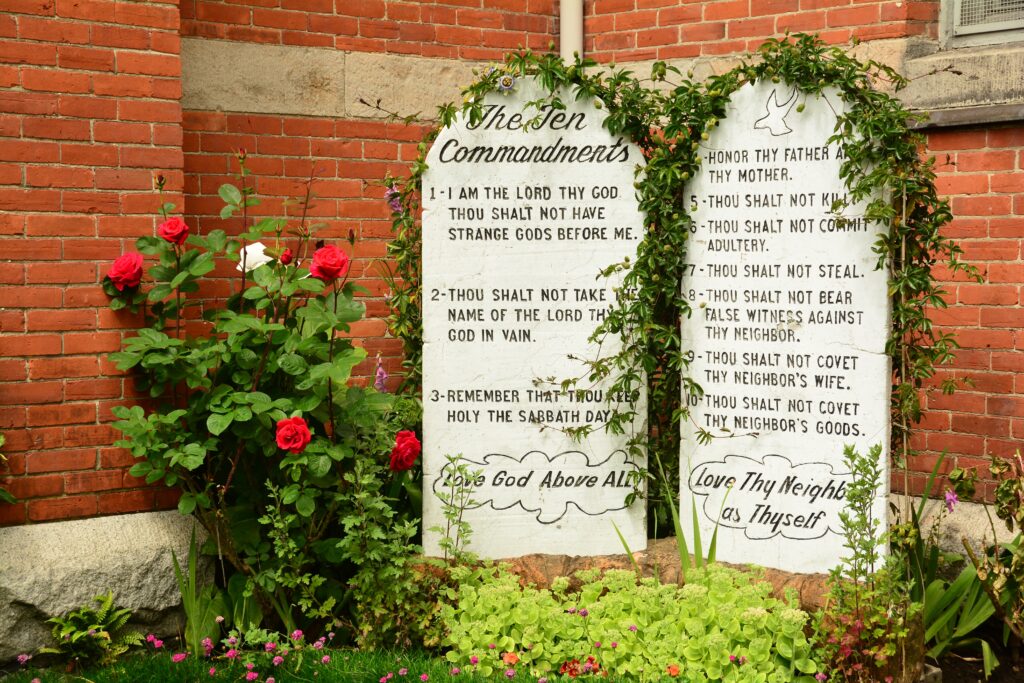Once upon a time in America, it was commonplace to find the Ten Commandments proudly displayed in grade schools and high schools throughout the country. Democrats and Republicans agreed on the display and used them as “rules” to create a stable, lasting civil society. But beginning about two decades ago, left-wing anti-religious organizations began to successfully convince federal courts and local school boards to take them down, arguing that their display was a violation of some nefarious “separation of church and state” requirement in the Constitution. But now, a red state is reversing the trend of removing the commandments.
Louisiana has just made history as the first state to require the display of the Ten Commandments in every public school classroom. Republican Governor Jeff Landry signed the bill into law on Wednesday. This follows the final passage of House Bill 71 by the state House of Representatives on Tuesday with a 79-16 vote, sending it to Governor Landry’s desk. The legislation faced opposition only from Democrats.
The bill mandates the display of the Ten Commandments in all classrooms of public and state-funded nonpublic schools, as well as postsecondary institutions in Louisiana. Each classroom must have the Ten Commandments on a poster or framed document that is at least 11 inches by 14 inches, with the text printed in a large, easily readable font. The text of the Ten Commandments must be the central focus, including commandments such as “Thou shalt not kill” and “Thou shalt not steal.”
The legislation clarifies that schools and institutions are not obligated to use public funds for these displays, stating, “This Subsection does not require a public or nonpublic school governing authority to spend its funds to purchase displays.” However, proper authorities “may spend its funds or donated funds to purchase the displays and may accept donated displays.” The State Board of Elementary and Secondary Education is responsible for adopting rules to ensure proper implementation.
BREAKING: Louisiana becomes the first state to require that the Ten Commandments be displayed in public school classrooms. pic.twitter.com/DNxRIki7wO
— Insider Paper (@TheInsiderPaper) June 19, 2024
Starting in 2025, classrooms will display the Ten Commandments, accompanied by a four-paragraph statement explaining their significant presence in American public education for nearly three centuries. This decision comes amidst ongoing legal controversies surrounding such displays in educational settings.
Republican State Rep. Dodie Horton defended the bill, asserting that the Ten Commandments are foundational to legal history and that the proposal aims to instill a “moral code” in classrooms. She dismissed concerns from Democrats, who argue that mandating a religious text in all classrooms breaches the establishment clause of the U.S. Constitution, which states that Congress shall “make no law respecting an establishment of religion.”
In a joint statement, the American Civil Liberties Union, the American Civil Liberties Union of Louisiana, Americans United for Separation of Church and State, and the Freedom from Religion Foundation expressed their concerns, stating that they were “deeply concerned” by the legislation.
“This bill is unconstitutional. The state may not require public schools to display the Ten Commandments in classrooms. Many faith-based and civil-rights organizations oppose this measure because it violates students’ and families’ fundamental right to religious freedom,” the statement read. “We are closely monitoring this situation and urge Louisianans to let the governor know that he should veto this bill. Politicians should not be forcing religious scripture on students. Our public schools are not Sunday schools, and students of all faiths—or no faith—should feel welcome in them.”
In 1980, the U.S. Supreme Court ruled in Stone v. Graham that a Kentucky statute requiring the Ten Commandments to be posted in public classrooms was unconstitutional. The decision was based on the Establishment Clause of the First Amendment, which prohibits the government from making any law “respecting an establishment of religion.” The Court found that the Kentucky law had no secular legislative purpose and served a predominantly religious function.
In 1980, the U.S. Supreme Court ruled in Stone v. Graham that a Kentucky statute requiring the Ten Commandments to be posted in public classrooms was unconstitutional. The decision was grounded in the Establishment Clause of the First Amendment, which prohibits the government from enacting any law “respecting an establishment of religion.” The Court determined that the Kentucky law lacked a secular legislative purpose and primarily served a religious function.



